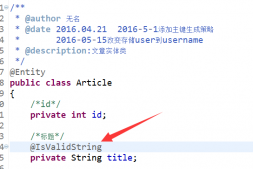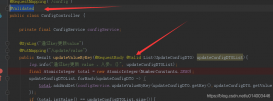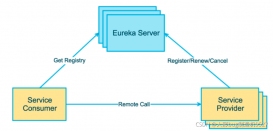環(huán)境配置介紹
jdk 1.8, spring Boot 1.5.3.RELEASE, MySQL, Spring Data, JPA
問(wèn)題描述
Spring Data提供了一套簡(jiǎn)單易用的DAO層抽象與封裝,覆蓋的CURD的基本功能,但是在諸多的情況下,需要用戶自定義DAO的實(shí)現(xiàn)方法,來(lái)實(shí)現(xiàn)更為復(fù)雜和精細(xì)的數(shù)據(jù)庫(kù)訪問(wèn)操作,該如何來(lái)解決這個(gè)問(wèn)題?
目標(biāo)描述
這里我們以自定義testAA的方法為例,來(lái)介紹如何實(shí)現(xiàn)自定義的DAO方法擴(kuò)展。
數(shù)據(jù)庫(kù)表的定義
我們這里定義了一個(gè)非常簡(jiǎn)單的mycity表,來(lái)作為示例的實(shí)體類BaseEntity:
數(shù)據(jù)庫(kù)表定義:

|
1
2
3
4
5
6
7
8
9
10
11
12
13
14
15
16
17
18
19
20
21
22
23
24
25
|
import java.util.Date;import javax.persistence.Column;import javax.persistence.GeneratedValue;import javax.persistence.GenerationType;import javax.persistence.Id;import javax.persistence.MappedSuperclass;import javax.persistence.Temporal;import javax.persistence.TemporalType;import javax.persistence.Version;@MappedSuperclasspublic abstract class BaseEntity implements java.io.Serializable { private static final long serialVersionUID = -2420979951576787924L; @Id @GeneratedValue(strategy=GenerationType.IDENTITY) @Column(name = "ID") private Long id; @Version private Long version; @Temporal(TemporalType.TIMESTAMP) @Column(name = "CREATE_TIME",columnDefinition="timestamp default CURRENT_TIMESTAMP") private Date createTime; @Temporal(TemporalType.TIMESTAMP) @Column(name = "UPDATE_TIME",columnDefinition="timestamp default CURRENT_TIMESTAMP ON UPDATE CURRENT_TIMESTAMP") private Date updateTime;} |
MyCity的定義如下:
|
1
2
3
4
5
6
7
8
9
10
11
12
13
14
15
16
17
18
|
import javax.persistence.Column;import javax.persistence.Entity;import javax.persistence.Table;import lombok.Data;@Entity@Table(name="mycity")@Datapublic class City extends BaseEntity { private static final long serialVersionUID = -7510771121759944670L; @Column(name="Name") private String name; @Column(name="country_code") private String countryCode; @Column private String district; @Column private int population;} |
這里的@Data使用了lombok提供的強(qiáng)大標(biāo)注,來(lái)簡(jiǎn)化冗余Getter/Setter方法的使用。
標(biāo)準(zhǔn)的CityRepository.Java,這里完全使用缺省提供的方法:
|
1
2
3
4
5
6
|
import org.springframework.data.jpa.repository.JpaRepository;import org.springframework.stereotype.Repository;import com.rose.money.City;@Repositorypublic interface CityRepository extends JpaRepository<City, Long>, CityRepositoryCustom{} |
這里的CityRepository繼承了2個(gè)父類,包括用戶自定義的接口類,讓用戶自定義的接口可以暴漏出來(lái)。
這里的CityRepsoitoryCustom定義了用戶的自定義方法:
|
1
2
3
|
public interface CityRepositoryCustom { public void testAA();} |
Notice: 這里的Custom后綴是約定的,不能隨意修改。
自定義方法的實(shí)現(xiàn)類:
|
1
2
3
4
5
6
7
8
9
10
11
12
13
14
15
16
17
18
|
import java.util.List;import javax.persistence.EntityManager;import javax.persistence.PersistenceContext;import org.springframework.beans.factory.annotation.Autowired;public class CityRepositoryImpl implements CityRepositoryCustom { @Autowired @PersistenceContext private EntityManager entityManager; @Override public void testAA() { List<Object[]> cities = entityManager.createNativeQuery("select id, name, district from mycity").getResultList(); for (Object[] objs : cities) { System.out.print("location 1:" + objs[0]); System.out.print("location 2:" + objs[1]); System.out.print("location 3:" + objs[2]); } }} |
這里的實(shí)現(xiàn)類就是讀取了幾條記錄,然后打印出來(lái)。其實(shí)現(xiàn)了Custom的接口類。
配置信息
application.properties:
|
1
2
3
4
5
6
7
8
|
spring.application.name=custom jpaspring.jpa.database=MYSQLspring.datasource.username=rootspring.datasource.driver-class-name=com.mysql.jdbc.Driverspring.datasource.password=123456spring.datasource.url=jdbc:mysql://localhost:3306/world?useUnicode=true&characterEncoding=utf-8&zeroDateTimeBehavior=convertToNull&allowMultiQueries=true&useSSL=truespring.jpa.hibernate.naming.strategy=org.hibernate.cfg.ImprovedNamingStrategy spring.jpa.show-sql=true |
測(cè)試
測(cè)試用例:
|
1
2
3
4
5
6
7
8
9
10
11
12
13
14
15
16
17
18
|
import org.junit.Test;import org.junit.runner.RunWith;import org.springframework.beans.factory.annotation.Autowired;import org.springframework.boot.test.context.SpringBootTest;import org.springframework.test.context.junit4.SpringRunner;import com.rose.money.repository.CityRepository;@RunWith(SpringRunner.class)@SpringBootTestpublic class CustomjpaApplicationTests { @Autowired private CityRepository cityRepo; @Test public void contextLoads() { City city = cityRepo.findOne(1l); System.out.println("city=>" + city); cityRepo.testAA(); }} |
測(cè)試的結(jié)果圖示:

總結(jié)
約定大于配置,Custom后綴實(shí)現(xiàn)與擴(kuò)展,非常的簡(jiǎn)單實(shí)用。
以上所述是小編給大家介紹的Spring Boot下如何自定義Repository中的DAO方法,希望對(duì)大家有所幫助,如果大家有任何疑問(wèn)請(qǐng)給我留言,小編會(huì)及時(shí)回復(fù)大家的。在此也非常感謝大家對(duì)服務(wù)器之家網(wǎng)站的支持!
原文鏈接:http://blog.csdn.net/blueheart20/article/details/72821384















